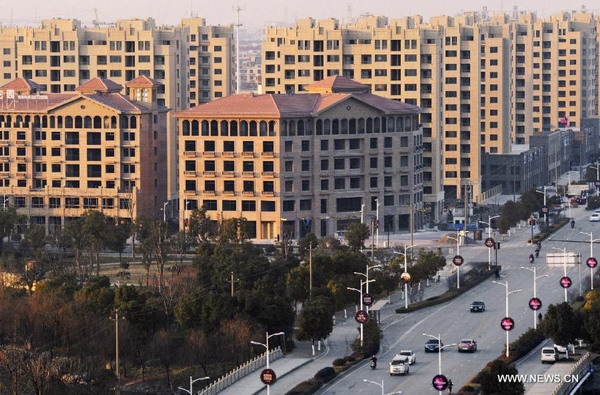China property market likely to bottom out
Updated: 2015-06-16 10:18
(Xinhua)
|
|||||||||||
 |
|
Photo taken on Jan 1, 2015 shows an apartment project in Huzhou, East China's Zhejiang province. [Photo/Xinhua] |
BEIJING - China's real estate market, widely scrutinized for its significance to the world's second largest economy, has shown glimmering signs of bottoming out in big cities.
The property market remains largely anemic, but a string of indicators show the sector's decline may be coming to an end in China's major cities.
In the first five months, home sales volume in first and second-tier cities increased by 41 percent and 13.4 percent, respectively, according to the National Bureau of Statistics (NBS).
In Guangzhou, 9,313 homes were sold last month, hitting a yearly record for the city. In Shenzhen, some newly-opened housing projects sold out in just a day.
In Beijing, 121 homes with a price of more than 100,000 yuan ($16,300) per square meter were sold from January to May - 17 times the level in the same period last year, according to market tracker Yahao.
"The real estate market is clearly warming up," said Wang Baobin, a senior NBS statistician.
On a national basis, home sales volume continued to dip in the first five months, but the rate of decline slowed by 4.6 percentage points from the first four months.
As a result, home sales value nationwide rose 3.1 percent in the January-May period from a 3.1-percent decline in the January-April period, the first increase since February 2014.
The bullish stock market created several millionaires over the last few months, which partly contributed to recovering home sales, according to Yahao.
But analysts said pro-growth measures, which have slowly been taking effect, are more significant.
The central bank has cut the benchmark interest rate three times since November. It has also lowered banks' reserve requirement ratio twice since February.
In March, China reduced down payment levels for second-home buyers to 40 percent from the previous 60 to 70 percent, and exempted business tax for sales of homes purchased over two years ago.
Li Qiaoling, an analyst with property agent Home Link, said home transactions are rebounding on the back of such measures.
Home prices are rising in big cities, but still sluggish in small ones.
First-tier cities saw average home prices up 1 percent on a monthly basis in April, whereas those in second- and third-tier cities declined 0.1 percent and 0.3 percent, respectively.
Despite the marginal improvement in major cities, Qin Hong, head of a research center under the Ministry of Housing and Urban-Rural Development, ruled out a sharp hike in home prices nationwide.
"Generally speaking, there is still an oversupply of housing. Therefore, it is unlikely to see skyrocketing prices across the country," said Qin.
Even in first-tier cities where demand exceeds supply, purchase restrictions will help keep prices from rising too rapidly, according to her.
The NBS is scheduled to release home prices in May on Thursday.
Related Stories
Beijing property market performances recover due to policies ease 2015-04-08 15:40
Small is beautiful, and better 2015-05-25 07:01
Property market still in the doldrums 2015-03-19 08:34
Property liberalization to shore up economic growth 2015-04-01 10:15
Land sales surge in first-tier cities 2014-12-26 03:54
Today's Top News
Why thousands of Chinese are migrating to Europe every year
European bank seeks to combine strength with AIIB
Alibaba sees business potential in Russia
Visa process for Chinese traveling through Europe streamlined
Grexit risk hikes
The most costly cities for expats
China, Russia sign railway deal
No mistreatment of GSK sleuth: Govt
Hot Topics
Lunar probe , China growth forecasts, Emission rules get tougher, China seen through 'colored lens', International board,
Editor's Picks

|

|

|

|

|

|






